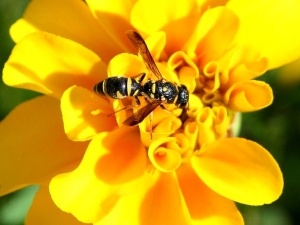The warmer the temperatures become, the higher the likelihood of seeing yellow jackets flying around.
w jackets are ever willing to protect their nests against predators. But are raccoons yellow jacket predators? This article looks into it
Raccoons do eat yellow jackets, raccoons can smell yellow jacket nests in the ground. Once the raccoon has sniffed out the nest, it will dig it up and eat the yellow jackets, and larvae, in the nest. The raccoon’s fur keeps them from getting stung
Table of Contents
Do raccoons eat yellow jackets?
Raccoons will eat almost anything. These animals eat a variety of meats, plants, insects, and fish. They even go as far as eating foods from our garbage to get a meal if they have to.
Yellowjackets are an insect that raccoons have no problem eating.
How raccoons manage to eat yellow jackets:
Raccoons have a great sense of smell, their sense of smell is so advanced that they can smell a yellow jacket’s nest in the ground. They go out looking for food at night and yellow jackets are a great food source for them.
Yellowjackets make nests underground. There may be thousands of yellow jackets in a nest at a time. This is great news for raccoons. When raccoons find a yellow jacket’s nest, they will dig up the nest and eat the yellow jacket’s inside.
In an effort to protect themselves, and their nests, yellow jackets will try to sting the raccoon many times.
Because raccoons have a thick layer of fur on their bodies, the yellow jacket’s stings won’t reach deep enough to harm the raccoon. The raccoon’s eyes, nose, and mouth are better targets but raccoons still manage to eat the insects with no issue
How raccoons act as nature’s pest control:
Raccoons eating yellow jackets is a good thing. Nature maintains the populations of animals through predators. Raccoons keep yellow jacket populations in check.
Having raccoons in the area when yellow jackets become active is a good thing as it helps to suppress the yellow jacket population.
That being said, raccoons don’t eliminate yellow jacket populations in the wild, so they will not eliminate yellow jacket populations in suburban areas.
The best way to get rid of yellow jackets is to hire pest control professionals
Do yellow jackets have any natural predators?
Skunks:
Skunks may be disliked because they release a noxious-smelling mist when they feel threatened, but they have one redeemable quality, they eat yellow jackets.
These animals dig up and eat yellow jacket nests just as raccoons do.
Bears:
Bears also enjoy digging up yellow jacket nests and eating these stinging insects. These animals eat a variety of animals as well as other stinging insects like bees.
Expect bears to eat yellow jackets and their nests in spring
Badgers:
These animals have no problem eating yellow jackets, they eat other stinging insects like bees with no issue. Their fur is also helpful in keeping yellow jacket stings from affecting them
Armadillos:
Armadillos are protected from yellow jacket stings by their hard, armor-like shell, even if yellow jackets do try to sting this animal, the armadillo won’t be affected.
The only part where the stings may affect the armadillos is in the animal’s eyes
Are yellow jackets good for anything?
Just as with any animal in the wild, yellow jackets are useful to the environment. These insects are pollinators.
Another way that yellow jackets are helpful is that they eat pests such as flies, grubs, and beetles to name a few.
Does killing yellow jackets attract more?
Raccoons may be able to kill and eat yellow jackets but killing these insects is not recommended for humans.
Killing yellow jackets attracts more yellow jackets. These insects release pheromones when they are killed, this may be good for raccoons because it brings in more food, but it can be disastrous for humans.
Conclusion:
In conclusion, yes raccoons eat yellow jackets. Raccoons eat a variety of insects, yellow jackets included.
These mammals dig up yellow jacket nests and eat the yellow jackets and the larvae inside.
Yellowjackets will try to sting the raccoon to protect themselves but the raccoon’s fur keeps it protected and unharmed
If you enjoyed this article then you may also be interested in other raccoon related articles. Here are some articles that you may be interested in: Do raccoons eat ticks?, Do raccoons eat termites?, Do raccoons eat toads?,


